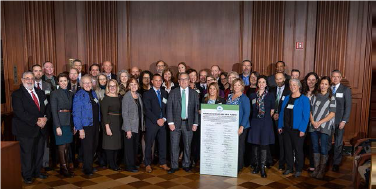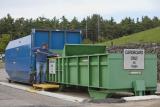The U.S. Recycling System
In the United States, recycling is the process of collecting and processing materials (that would otherwise be thrown away as trash) and remanufacturing them into new products.
On this page:
- U.S. Recycling System Overview
- Benefits of Recycling
- Current Challenges Facing the System
- Actions Taken to Address the Challenges
U.S. Recycling System Overview
While the recycling process often differs by commodity and locality, there are essentially three main steps: collection, processing and remanufacturing into a new product.
- Collection: Recyclable materials are generated by a consumer or business and then collected by a private hauler or government entity.
- Processing: The materials are transported by the collector to a processing facility, such as a materials recovery facility or paper processor. At the processing facility, the recyclables are sorted, cleaned of contaminants and prepared for transport to a milling facility or directly to a manufacturing facility. Some commodities may require additional processing for additional sorting and decontamination. For example, glass and plastic are often sent to glass beneficiation plants and plastics reclaimers, respectively, where they are processed into mill-ready forms.
- Remanufacturing: After all necessary processing has been completed, recyclables are made into new products at a recycling plant or other facility, such as a paper mill or bottle manufacturing facility.
Benefits of Recycling
Environmental, economic and community benefits can be attained from recycling.
For the environment, recycling:
- Reduces the amount of waste sent to landfills and incinerators;
- Conserves natural resources such as timber, water and minerals; and
- Prevents pollution by reducing the need to collect new raw materials.
For the economy, recycling:
- Increases economic security by tapping a domestic source of materials; and
- Saves energy.
For communities, recycling:
- Supports American manufacturing and conserves valuable resources; and
- Helps create jobs in the recycling and manufacturing industries in the United States.
Current Challenges Facing the System
While the benefits of recycling are clear, growing and strengthening the U.S. recycling system to create more jobs and enhance environmental and community benefits will require multi-stakeholder collaboration to address the challenges currently facing the system. Current challenges include:
- Most Americans want to recycle, as they believe recycling provides an opportunity for them to be responsible caretakers of the Earth. However, it can be difficult for consumers to understand what materials can be recycled, how materials can be recycled, and where to recycle different materials. This confusion often leads to placing recyclables in the trash or throwing trash in the recycling bin or cart.
- America’s recycling infrastructure has not kept pace with today’s waste stream. Communication between the manufacturers of new materials and products and the recycling industry needs to be enhanced to prepare for and optimally manage the recycling of new materials.
- Domestic markets for recycled materials need to be strengthened in the United States. Historically, some of the recycled materials generated in the United States have been exported internationally. However, changing international policies have limited the export of materials. There is also a need to better integrate recycled materials and end-of-life management into product and packaging designs. Improving communication among the different sectors of the recycling system is needed to strengthen the development of existing materials markets and to develop new innovative markets.
- Stakeholders across the recycling system agree that more consistent measurement methodologies are needed for measuring recycling system performance. These more standardized metrics can then be used to create effective goals and track progress.
Actions Taken to Address the Challenges
EPA and its stakeholders have taken the below actions since November 2018 to address the challenges facing the U.S. recycling system.
Stakeholder Dialogues
In 2018, EPA conducted a series of roundtable conversations with key stakeholders involved in the recycling system. The roundtables were a chance to hear different perspectives on the challenges and opportunities within the system. The conversations led to the identification of four key action areas, and stakeholders formed workgroups to further explore and develop actions around the areas. Within those areas, the stakeholders expressed ideas for future actions that federal, state and local governments; industry associations; recyclers; waste haulers; material users; and non-governmental organizations could take to improve the U.S. recycling system. The action areas are:
- Promote Education and Outreach;
- Enhance Materials Management Infrastructure;
- Strengthen Secondary Material Markets; and
- Enhance Measurement.
America Recycles Day Summit
 On November 15, 2018, EPA Administrator Andrew Wheeler hosted the America Recycles Day Summit, which brought together stakeholders from across the U.S. recycling system to join EPA in signing the America Recycles Pledge. All 45 signing organizations, including EPA, pledged to work together to identify specific actions to take in addressing the challenges and opportunities facing the U.S. recycling system. Through the pledge, organizations committed to leveraging their collective expertise, strengths and resources to address these challenges and opportunities. Participants included representatives from federal, local, state and tribal governments; the recycling industry; and manufacturers and brands.
On November 15, 2018, EPA Administrator Andrew Wheeler hosted the America Recycles Day Summit, which brought together stakeholders from across the U.S. recycling system to join EPA in signing the America Recycles Pledge. All 45 signing organizations, including EPA, pledged to work together to identify specific actions to take in addressing the challenges and opportunities facing the U.S. recycling system. Through the pledge, organizations committed to leveraging their collective expertise, strengths and resources to address these challenges and opportunities. Participants included representatives from federal, local, state and tribal governments; the recycling industry; and manufacturers and brands.
- For more information on actions taken after the Summit, view the Framework for Advancing the U.S. Recycling System.
- View picturesExit and a highlight videoExit of the event.
America Recycles Pledge
We invite U.S.-based organizations to sign the America Recycles Pledge. Visit our page to sign the pledge and join others that have signed it to work toward a more resilient materials economy.


